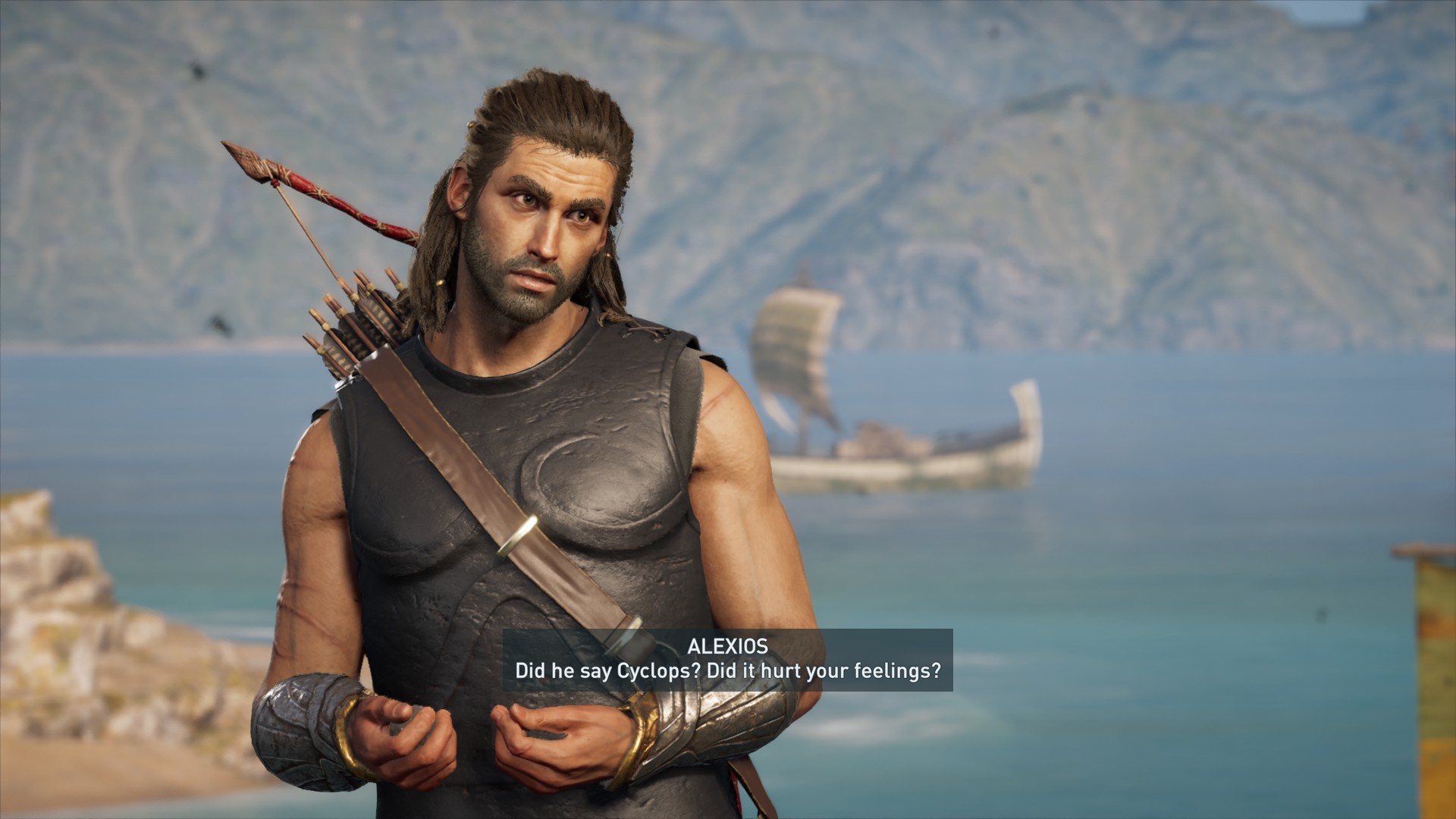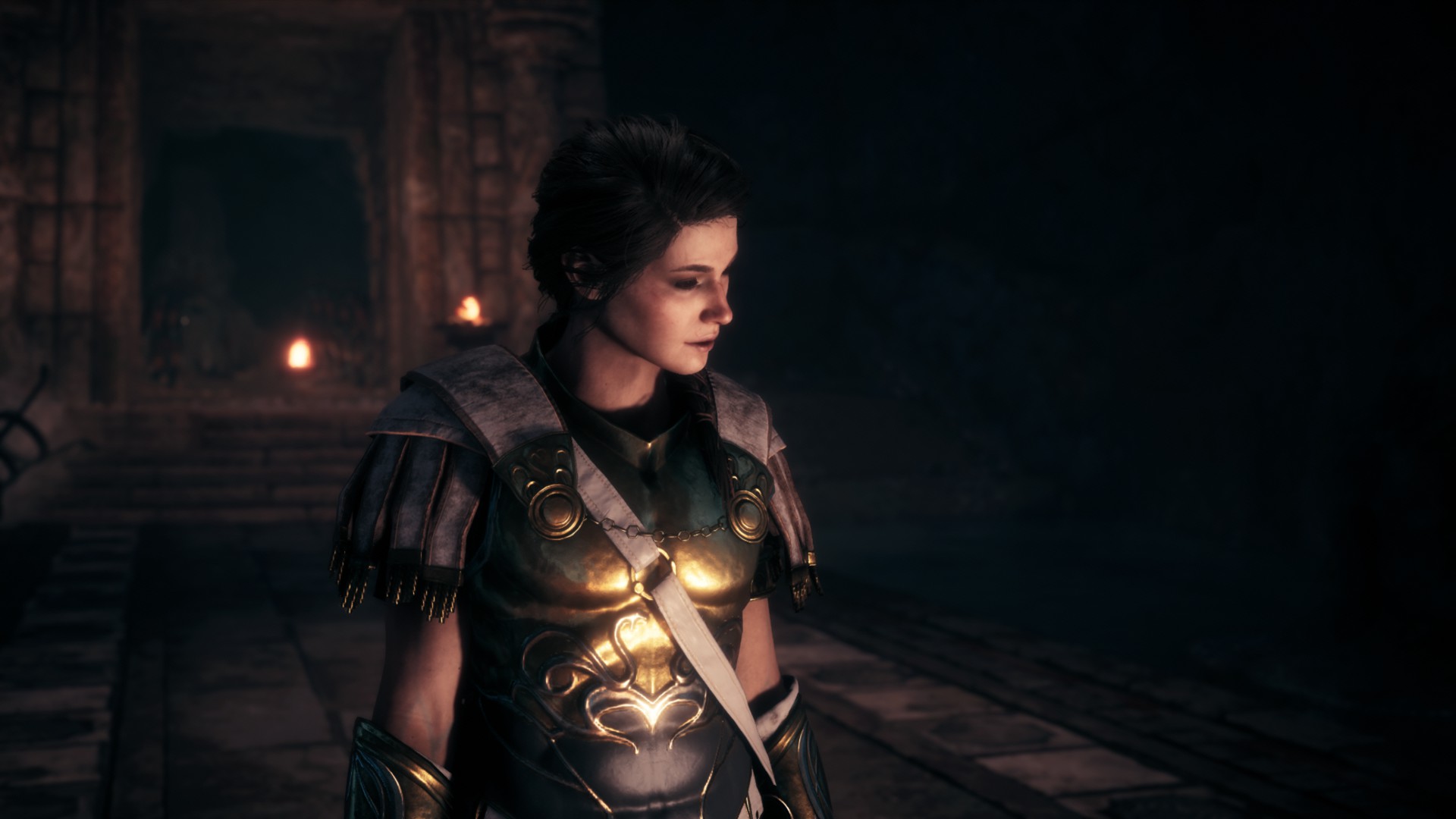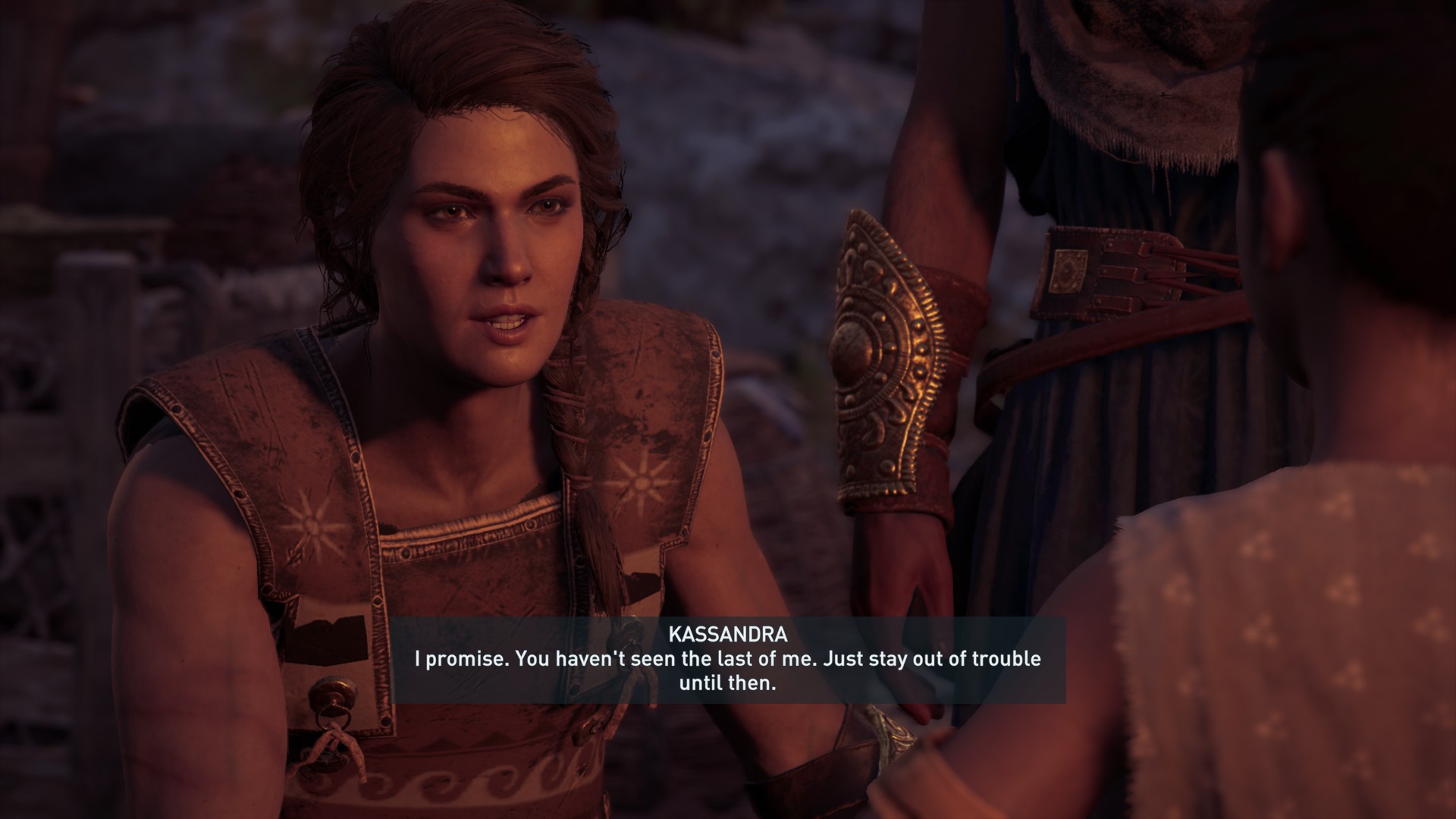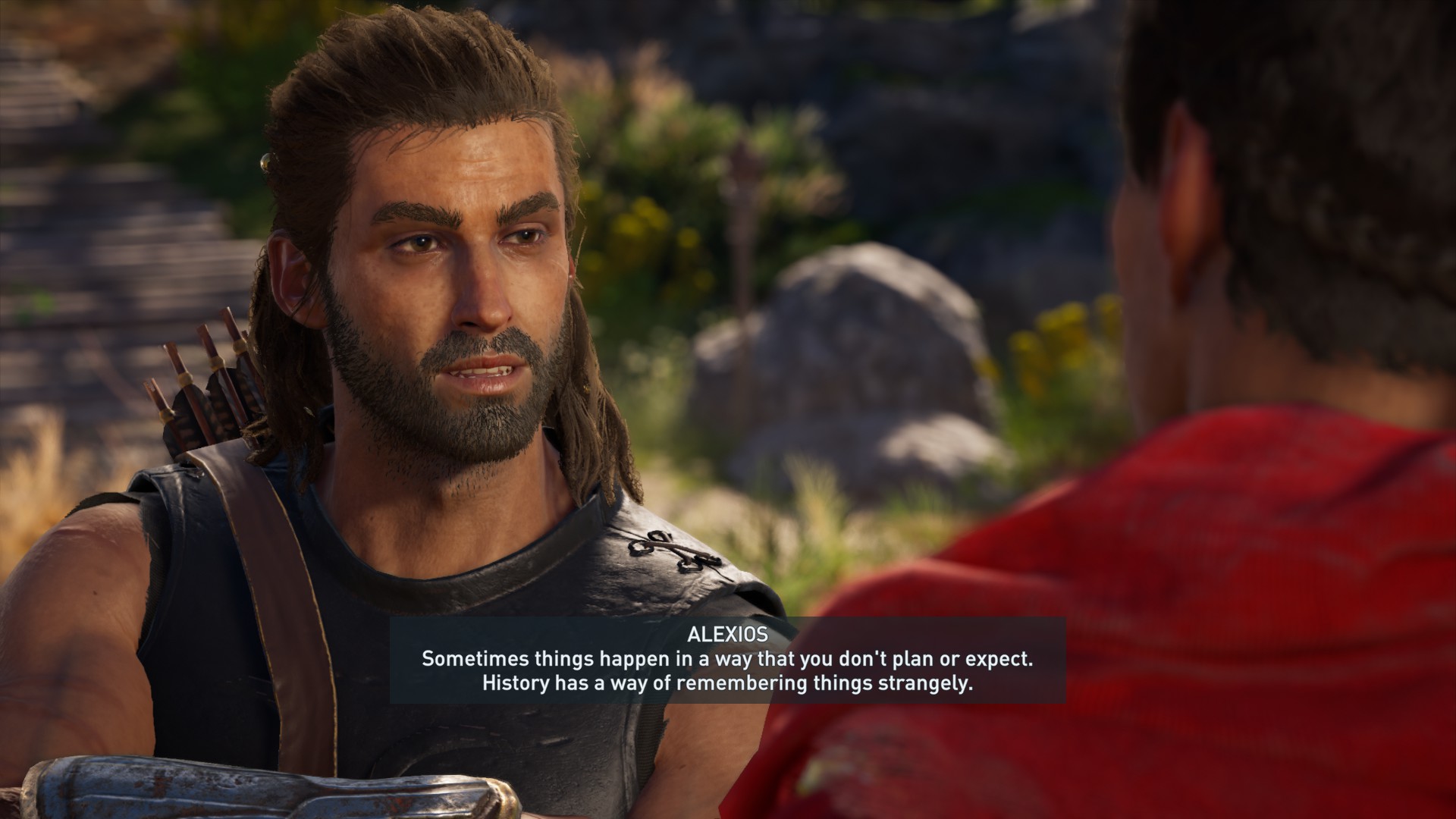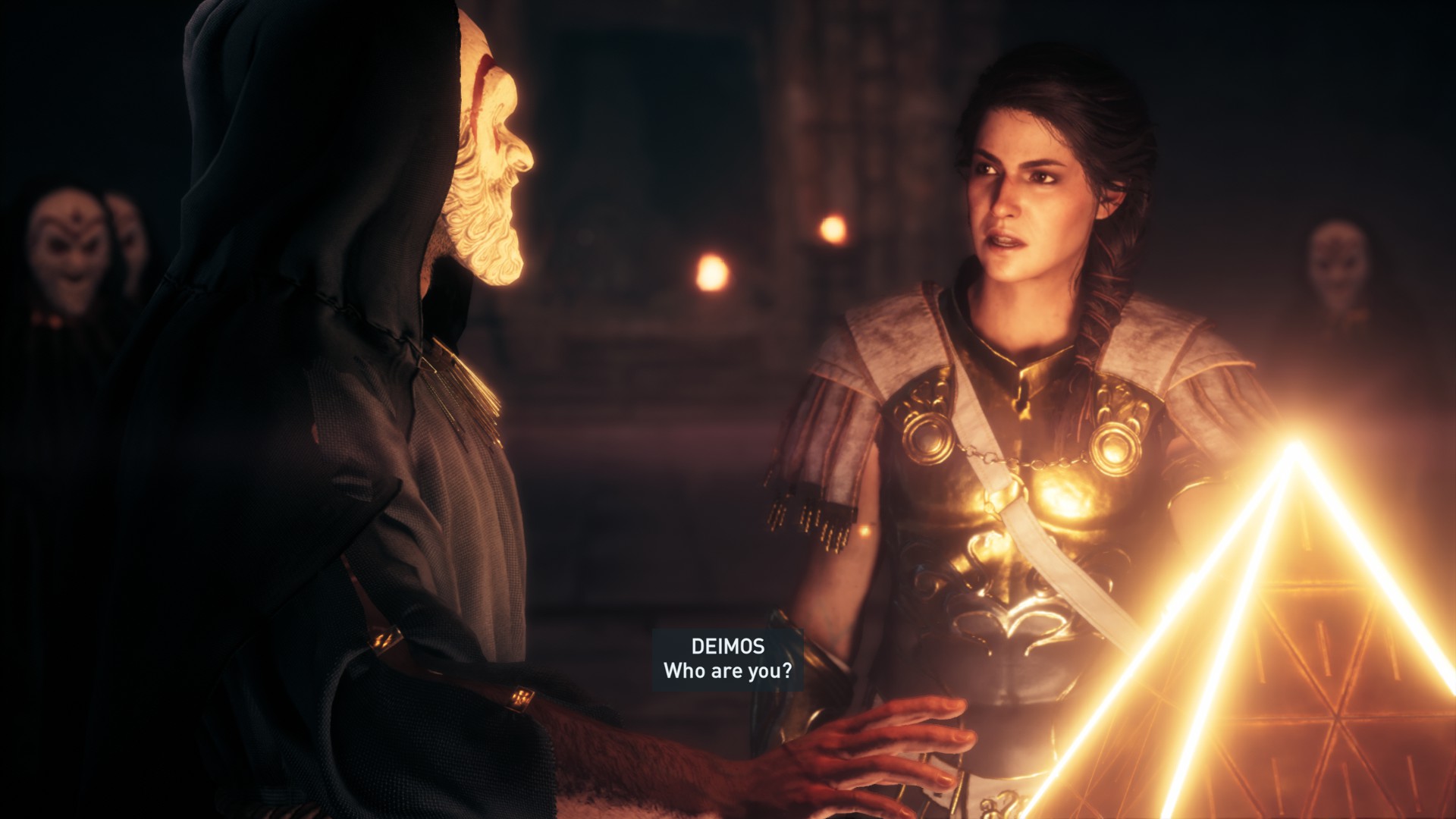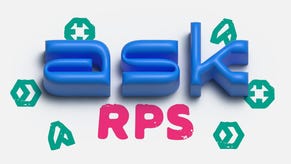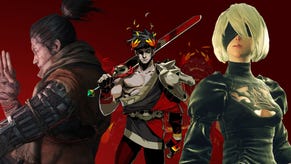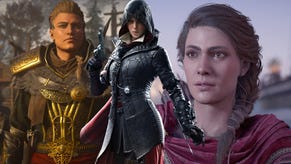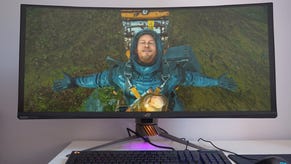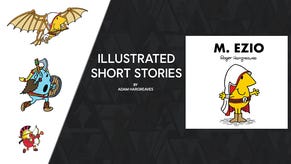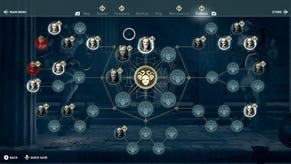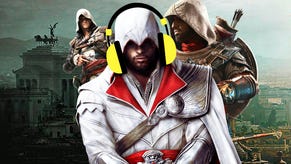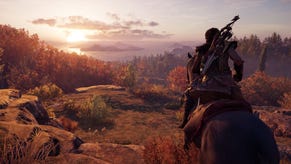We talk to Alexios and Kassandra voice actors about the beauty of mocap, and using Pink Floyd to get psyched up
That'll be the Deimos
Contains some spoilers.
Assassin’s Creed Odyssey is a proper action-RPG, complete with romance opportunities, conversation trees, branching storylines, and bales of soft material to leap into from improbable heights. While well-written and expansive, much of the story’s appeal can be laid at the feet of its charismatic leads. Greek actors Michael Antonakos and Melissanthi Mahut provide the voices and performance capture for Alexios and Kassandra, bringing the characters to life with unexpected nuance (as previously chronicled by some handsome, overworked soul). As a game developer myself, my only question after sinking dozens of hours into it is: how. How do the protagonists remain distinct, internally cohesive, and roughly equivalent, across thousands of lines of the same script?
So I asked Antonakos and Mahut themselves, who taught me about Ubisoft’s craft in producing games on a massive scale, and the methods the actors used to make each hero their own.
RPS: You developed Alexios and Kassandra together. What were some intentional choices you made to give the characters distinct personalities despite sharing the same script? Were these decisions made together, or individually?
Michael: I had already started working on the game when Melissanthi joined, and we’d already recorded scenes with Alexios at this point. So I stuck to what was established as far as voice style. When Mel was brought on, Ubisoft flew us both to Quebec City where we spent a week getting to know each other, and the game team. Mel and I discussed the characters, we heard each other’s thoughts and perspectives, and started building their personalities from there. We decided on their humour and how they felt about their upbringing. How they saw the world, stuff like that. When we did the motion capture elements of the game, we did everything together. We worked on scenes before we even went into rehearsals, and we made all our decisions as a team. The hard part was working out of different studios for the VO elements of the game, which is the majority. I recorded in Toronto and Mel recorded out of London, and we had two Voice Directors (both wonderful). There was a difference in approach that made for varied performances from both of us, and the NPCs. That made it hard to navigate and stay consistent; avoiding the issue of the characters feeling like they are [doing] different scenes.
Melissanthi: We were given the first “skeleton” of the character with the writers and creative directors in our first meeting at Ubisoft Quebec. They shared their idea of the character and gave us insight as to their history, possible path and general characteristics. After that Michael and I had long discussions about where we saw the character going and what we thought their main attributes were and how they would respond in key situations. On the mocap floor we constantly gave each other notes as to how we would like to approach certain scenes. As for the Voice booth, that was slightly different as it was a lengthier process and one where we were not in the same country let alone the same room, so Michael and I couldn’t keep in check with one another. We followed our personal choices, guided by our respective directors.
RPS: Whichever character the player doesn’t choose after the prologue becomes Deimos, an agent of the Cult of Kosmos. How did you adjust your character to become this dark reflection, and why?
Melissanthi: For me the Deimos version had to have elements of Alexios/Kassandra in one way or another. They are after all brother and sister and therefore of the same ilk. So I just took a few key elements that made the elder sibling what they are, and put a filter over them. I tried to imagine how a character, a younger sibling would evolve, being the “rejected one”, someone who had undergone what Deimos had to undergo whilst growing up. The feeling of having been abandoned, but at the same time possessing a god-like strength. I tried to imagine what that is likely to do to one’s psyche but all the while preserving the “humanity” in them. You have to understand why someone makes their decisions and empathize with them even if these decisions are considered cruel or inhuman.
Michael: I decided to play Deimos as a different person entirely. He was the second child and not the first-born like Alexios. Deimos was the younger brother to Kassandra. He did not have the upbringing of being raised in Sparta, so his moral compass would have been very different. I felt like he had to be different, and sound different. Deimos, has been raised to think he/she is better than everyone else. Above the world and everyone in it, and they want to keep it that way. There is little room for compassion and sympathy in them because they were never shown any. They’re a warrior through and through. So I toned his voice slightly darker and lower than Alexios, gave him no room for a smile unless it had a sense of tormenting behind it. He got his need for love met, by making himself feel more powerful than others.
RPS: You can hear the pain in Deimos-Kassandra's voice when she meets Alexios for the first time, and the burden Alexios carries on the topic of family. Alexios and Kassandra have similar (but varying) physical scars as well. Script aside, did you invent a personal background for your character that explains their differing reactions and appearance?
Michael: I did create my own backstory, and then the writer’s filled us in on the backstory they had created. But some of what I’d done, stuck with me. I think Melissanthi and I had slightly different ways of expressing ourselves but not by much. The scene you’re mentioning we both crafted together, and we had the same feelings and intentions behind it. But like all things, it just comes out slightly different from each person. For me, in that moment, Deimos is trying to control the unexpected feelings that are coming up for him, and he doesn’t know how. That moment wasn’t pain for him, but fear, of the unknown, something he’s not used to, and something he doesn’t know how to control, so, he explodes… brutally.
Melissanthi: What he said…ha ha ha…seriously.
RPS: Michael, your portrayal of Alexios has received criticism for being one-note, or a typical macho game protagonist. What were the intentions behind your performance? Does Alexios have layers and complexities that can be missed in certain isolated scenes?
Michael: Ha ha! Oh man… that is pretty funny. You know, a work colleague said something to me that I thought was very useful. Alexios represents the older games, the style, the machismo etc. I just imagined making a character who grew up in Sparta, one of the toughest environments in the world for a child, then he gets forcibly thrown of a cliff and left for dead at six years old, has no more formal education, has to survive by becoming a headhunter for hire as a young man and has little trust for anyone… and he’s an animated video game character. So that’s what I attempted to do. It was a challenge because his voice is rough and low, so there was not a lot of room to play with range and tone without breaking him into a different style than what I had started with. But when you play it beside Mel’s more natural lighter sound, which allows for more ups and downs in range, it can seem more one level.
As far as the machismo [goes], yes, now add the Ancient Greek warrior element, give him the power of a Demigod, and the insecurity from being a hurt child with huge guilt issues, and he has something to prove. His arrogance is just a show, a mask for his insecurity of being alone. He’s kind of a big kid acting tough, but the difference is, well… he is tough.
Michael (continued): The voice was a decision; I didn’t really even know what Alexios looked like when I started building him. I wanted something familiar to the franchise, so I took a little from Ezio [Auditore of Assassin’s Creed II], but then I wanted something powerful and threatening, so I took a little from Batman and Wolverine animated series characters, he’s like boisterous Bruce Wayne with a Greek accent, and when he’s angry he’s like an explosive Wolverine. So yeah, he definitely has some 80’s - 90’s cartoon elements in him. You would be correct. He’s kinda like a Greek super hero or even better, a Greek Conan the Barbarian. No one said anything to me about adjusting, so I just kept doing it.
There are many scenes in the game where you can see much of his range. Sometimes he acts big and tough, and sometimes he’s softer and kind. Depends on the moment and the choices you make.
RPS: Melissanthi, after your first video game role of this scale, what did you learn that you plan to take into your next major role (whatever that might be)?
Melissanthi: WHhhhhoooah. I cannot begin to even. I had never had any experience with mocap before this. So I learned the absolute beauty that is mocap acting. It is a brilliantly inclusive medium of expression and it flexed every single muscle that had kinda gone to sleep since drama school. I realized how hard the job of a voice actor is, being in a room with no one else to act off of and relying completely on your own imagination to create the scene and setting that you are asked to bring truth to. That was probably one of the biggest lessons I have received to this day. And most importantly I will take away the feeling of what it is like to act with someone like Michael who is so open and giving and willing to exchange criticism not for criticism’s sake but for improvement of the work and the scene. It will be a long time, I think before I find someone that I enjoy working with as much as Michael.
RPS: How does it feel reading criticisms of your character performances? Before release, what are methods you used to iterate on these performances, to produce the results players now get to experience?
Melissanthi: It was definitely overwhelming. Especially at first. The sheer volume of articles written about the game and the expectations that were building up even before its release were epic. It was even more so after the release.. criticism is very much wanted, useful, often constructive and then sometimes it can be just plain blunt and one-sided, but what can you do. Do your best and hope for the best.
Michael: Well, at first it was tough for me. I had a panic attack for sure. But then I had to take a step back and tell myself they’re only getting a snippet of an idea of who the character is. Wait till the game comes out and they play him as a whole. Which did change, and people really started to warm up to and appreciate Alexios’ performance. Thank you to all of those people by the way. I also decided to look at the criticisms people were giving and I’ve now been able to watch the scenes now since its release. I am seeing whose points were valid and whose were just opinion, I’ve learnt a lot, and I’m improving it.
RPS: Roughly what percentage of your in-game performances were motion-captured? In motion-capture sessions, did you ever find yourself needing to copy or imitate an expression, gesture, or nuance of your partner? If so, why?
Michael: Only about 10%-15% of the game is motion capture performance by us. You are getting an AI doing gestures majority of the time, or stunt men doing the fight scenes. Very talented stunt team lead by the incredible Ken Orama.
In the motion capture studio we did our best to match each other’s performances, because they would use the same edits to cut the scenes together. We had our own styles, but did our best to match gestures and movements. If Mel did something spontaneous or funny in a scene and I was up after her, I would take it and use it, and vice-versa. We are a great team and I adore working with her.
RPS: What do you do to get into your character, particularly when they have to fit so many player-defined avenues, as well as the dual role of Deimos? Are there any particular rituals you have, or details about your character's past that you call to mind before a scene?
Michael: For Alexios, I found a song for him, a soundtrack to his pain. I settled on Pink Floyd’ s Wish You Were Here. I would listen to it while walking around, getting into his body, his physicality, his walk. It centred me. The song captured the feeling of his life at the beginning of the game.
For Deimos I did some breath work and it got me into a lower body and vocal placement, very grounded and heavy. I wanted him to be a bully. Slow and brooding, making others unnerved and uncomfortable, ruling through fear and intimidation.
Melissanthi: Generally it depends on the medium. I mean if it is stage, film or, now, mocap. For stage, because it is a complete run through of a story whose entirety you know as you have been working on it for some time, it is just a question of prepping emotionally and getting energy up. And usually music helps me with that. I am the annoying actor backstage with headphones on. For film and mocap it’s slightly different. It is just concentration on the intention of the scene and the actor/partner in the room and what they bring to the dialogue and situation.
RPS: What is your favorite in-game conversation in terms of the vocal performance you were able to deliver, or the physical actions you took?
Melissanthi: I loved anything that had to do with unleashing anger and sarcasm. Maybe I should look into that. A big favourite were scenes with children. I absolutely loved those.
Michael: I would say the scene with Deimos and our mother (the incredible Maria Syrgiannis). It was beautiful and painful, and I loved watching Melissanthi act that day, she was brilliant. The other scene I enjoyed was between our father (Elias Toufexis) on the mountaintop, those moments were some of my favourites, the choice options were so elevated. It was great writing.
RPS: Thanks for your time.

